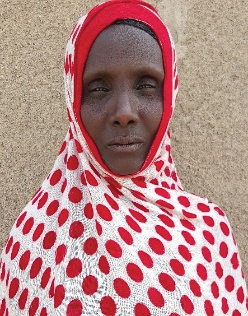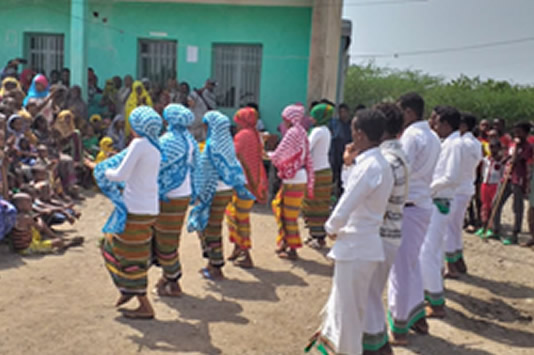In the small village of Buri Kebele, in the Amibara district of the Afar region, 30-year old Ahadi Geneto lives with her eight children and husband of 14 years. Like nearly 90 percent of girls and women in Afar, Ahadi underwent female genital cutting (FGC) at the young age of two years old.
Ahadi described that the genital cutting she experienced, followed by stitching and the de-infibulation procedures, caused her severe pain. She said, “During my childhood, I had been informed that every Afari girl has passed through these cultural practices and in my community, girls cannot be married without genital cutting. I always worry about how to stop this cultural practice. Individuals who carry out genital cutting consider the practice as their source of income and they are highly respected in the community.
This all makes it difficult to challenge these individuals and, since I am a woman, no one will hear me if I speak about the side effects of female genital cutting and other cultural practices which have been worsening the lives of girls and women.”
Ahadi, however, found support and encouragement to speak out through her kebele’s Women Development Army (WDA). She describes becoming a WDA leader as a turning point in her life: “my husband is a police officer and he supported me to be a member of the WDA in my kebele.
After serving as a member for some time, I became a WDA leader. I believe this is the turning point in my life to learn about sexual reproductive health services and the side effects of FGC and other cultural practices in our community.”

Ahadi, with other women leaders in her community, attended a training on community dialogue delivered by the A’ago project. Soon after, members of the WDAs were on the ground running, regularly conducting community dialogues throughout Amibara. After attending the training and dialogues, she began to reflect more closely on her own experiences with reproductive health: “I understood the correlation of FGC and challenges during child bearing and I started to recall how much I suffered during my eight consecutive deliveries without spacing. I had faced very critical bleeding, which I have always considered it to be something normal.
I always share what we discuss during the dialogues with my husband and friends. I have also started to speak boldly about socio-cultural practices in our community that negatively affect women. I also fearlessly inform individuals about the sexual and reproductive health (SRH) services readily available to them at health posts and health centers.”
after learning about the impacts of FGC from WDA trainings and dialogue sessions, I decided to exempt my daughters from FGC by discussing with and convincing my husband against it. As a WDA leader, I repeatedly invited religious leaders to our WDA discussions to convey information to the participants on the negative impacts of FGC, early and forced child marriage, and the necessity of utilizing SRH services, particularly family planning. I discussed this with my husband and use IUCD as my choice of family planning method. Many other WDAs have done the same thing for themselves, their daughters, and their relatives.”
Ahadi is not only educating others on SRH, but also actively taking steps to change the health trajectory of those within her own home, starting with herself: “after learning about the impacts of FGC from WDA trainings and dialogue sessions, I decided to exempt my daughters from FGC by discussing with and convincing my husband against it. As a WDA leader, I repeatedly invited religious leaders to our WDA discussions to convey information to the participants on the negative impacts of FGC, early and forced child marriage, and the necessity of utilizing SRH services, particularly family planning. I discussed this with my husband and use IUCD as my choice of family planning method. Many other WDAs have done the same thing for themselves, their daughters, and their relatives.”
Ahadi is confident that norms and behaviors are shifting for the better in Buri kebele. She is happy that FGC is frowned upon my more and more people in her community, and feels hopeful that the end to harmful traditional practices is near: “the dialogues have become a platform to identify our social and cultural barriers to using SRH services and stopping cultural practices which have been putting our lives at risk for many years. If we strengthen and keep conducting our dialogue sessions regularly, I am hopeful it will take a very short period of time to end FGC in our kebele.”
The A’ago project, which works closely with WDAs, is implemented in 10 districts. A’ago, the Afari word for ‘Hope’ supports Regional Health Bureaus to expand access to comprehensive family planning services for young people. Expanded access, however, does not necessarily increase use. To address deep-rooted sociocultural barriers, A’ago works with women like Ahadi to mobilize local groups, such as the Afar Development Association (AfDA), to expand community engagement and address community-level barriers to seeking out sexual and reproductive health (SRH) services.
Amref Health Africa teams up with African communities to create lasting health change.

